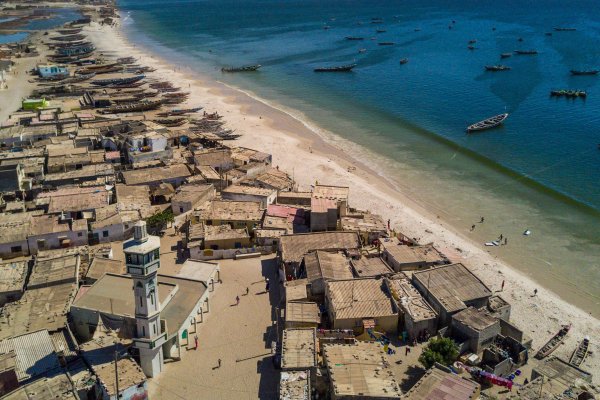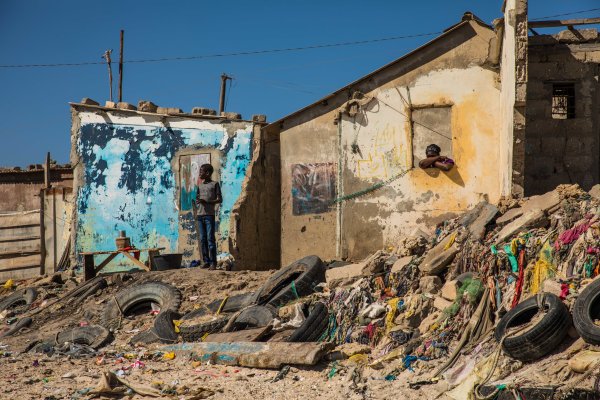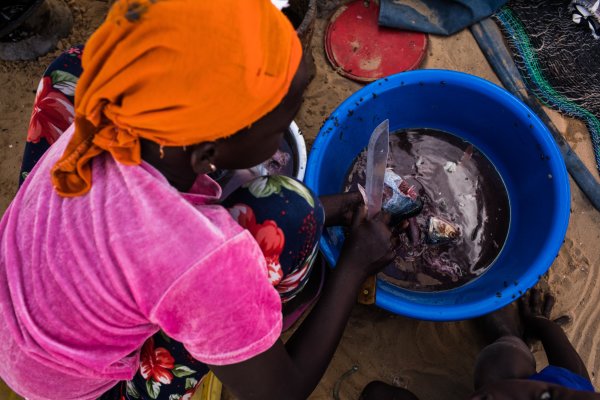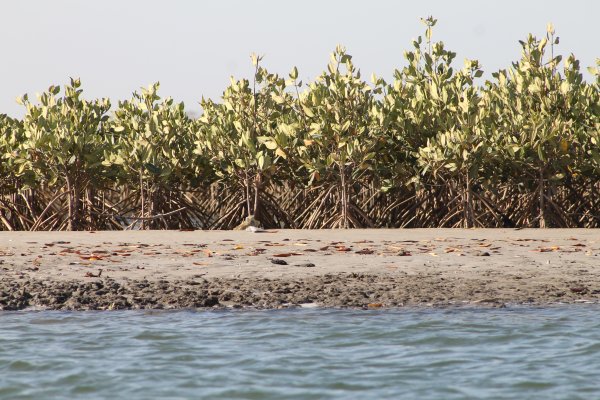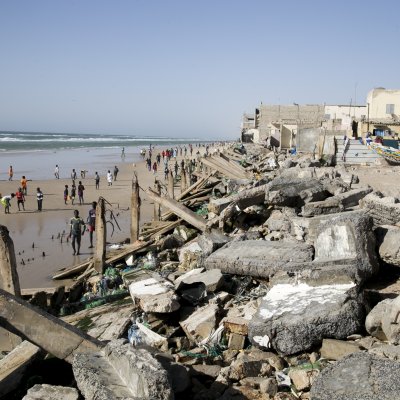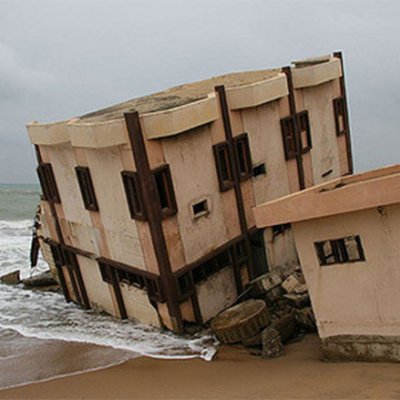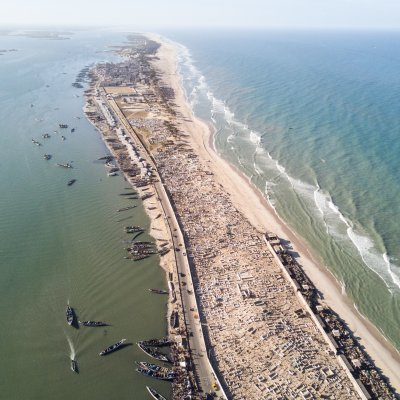Resilient coastlines, resilient communities
In its first two years of operation, the WACA Program has made significant progress in leveraging public finance via traditional development projects, engaging the private sector, and developing new financing instruments
Coastal erosion and flooding in West Africa severely threaten communities, livelihoods, safety, and investments. A study undertaken by the World Bank estimates that the environmental degradation in the coastal areas of Benin, Côte d’Ivoire, Senegal, and Togo cost $3.8 billion, or 5.3 percent of the four countries’ combined GDP in 2017.
Beyond the economic cost, disasters exacerbated by coastal degradation take lives and destroy livelihoods, but also prevent future development and trap the most vulnerable in poverty. Approximately 40 million people in West African countries are at risk from impacts of the changing climate including threats of rising sea level, coastal erosion, storm surge, flooding, and salinity intrusion.
Coastal erosion is caused by a combination of poor management of coastal sediment flow around infrastructure such as ports, retention of sediment in dams, mining of riverine and beach sand, offshore deposit of dredged sediment, and loss of coastal habitat that would otherwise physically protect or slow the retreat of the coast. Simply put, there is a sediment budget deficit and this problem cuts across national borders; it is a complex challenge that requires innovation and technical expertise, in addition to finance.
The NDF co-financed West African Coastal Areas Management (WACA) Program is a convening platform that assists West African countries in managing their coastal areas sustainably and enhancing their socio-economic resilience to the effects of climate change, facilitating access to technical expertise and financial resources for these countries.
Strong focus on joint action
The recently published WACA Annual Report 2020 outlines the ongoing measures in place to increase the resilience of West Africa’s coastal communities. At the heart of WACA is a strong engagement at the regional level to promote common policy and cross-border interventions. WACA boosts the transfer of knowledge, fosters political dialogue among countries and mobilises public and private resources.
One of the regional activities concerns implementing commitments made by countries to the Abidjan Convention that works to protect the coastal-marine environment. WACA supports implementation of four of the convention’s protocols that the countries have committed to: mangroves, marine litter, oil and gas, and integrated coastal zone management. With the support from WACA, the Secretariat of the Convention, in partnership with GRID-Arendal (Norway), has provided training to countries in Marine Spatial Planning (MSP) for sustainable coastal management.
Scale-up and leveraging using the WACA Platform
As part of the WACA Program, the scale-up Platform has made significant progress in developing knowledge, leveraging investment financing, and facilitating regional technical and political dialogue on strengthening coastal resilience. The Platform serves as a vehicle for scaling current levels of collaboration and is supported by three pillars: Knowledge & Solutions, Finance & Instruments and Dialogue & Engagement.
Under the Finance Pillar, a Marketplace was held as a new way for countries to pitch priority projects for coastal resilience and kickstart a dialogue with financial and technical partners to move them to investment-ready projects.
“At the (WACA) Marketplace in Abidjan, which brought together countries, donors and the private sector to find solutions to coastal issues, it was heartening to see the private sector and financiers listen to countries pitch projects on coastal resilience and express their willingness to invest in these projects,” says Simeon Ehui, Regional Director, Africa Sustainable Development, World Bank.
Looking forward
According to the WACA Annual Report 2020, WACA’s geographic scope covers 17 West African countries, supporting the resilience of their coastlines. The Program commenced with six countries in 2018, and now five additional countries (Ghana, Guinea, Guinea-Bissau, Nigeria and The Gambia) are set to benefit from ongoing project preparations and technical assistance. In the future, the Program plans to engage in Cabo Verde, Cameroon, Gabon, Liberia, and Sierra Leone.
As a result of World Bank’s engagement with development partners and the first Marketplace, a total of USD 650 million has been leveraged for approval or in the pipeline of donors.
The catalytic power of NDF’s early support
In 2015, NDF was the first donor to provide seed funds to WAEMU and the World Bank to catalyse the development of WACA. During the subsequent investment phase, more than USD 200 million was contributed, initially by NDF, the World Bank, and the Global Environment Facility (GEF), and later, around ten other financing partners joined the Program.
NDF is providing finance to the Bank-executed part of the WACA Platform, supporting the generation of new studies, access to innovation and solutions, and developing and testing new financing instruments such as PPPs, and supporting partnerships with regional institutions, countries and others needed to bring the support to countries at the scale needed. In parallel, and in direct liaison with the countries, NDF is providing loans to Senegal and Benin in support of their resilient investment projects (WACA-ResIP).
Shared Nordic interests
With their own expansive coastal areas, the Nordic countries have a common interest in coastal and marine issues. They share a profound respect for nature and its environmental services, and the urge to ensure sustainable use to benefit people in the long term. The countries also share cultural and natural assets, and from historic times have practiced integrated and cross-border management of coastal areas. Over the years, Nordic countries have supported innovative approaches to development, emphasizing governance, circular economy, climate, and participation with a distinct strategic focus on leveraging resources.
Against this backdrop, a Nordic Hub in support of WACA is emerging. In 2020, a series of consultations with NDF and 20 public and private institutions in Nordic countries started and saw the emergence of several opportunities for Nordic countries to support research and technical programs in coastal resilience. When fully connected to WACA, these initiatives could accelerate the access of West African countries to Nordic expertise on social development aspects of coastal management, effective community participation, plastic pollution, circular economy, capacity development, and private sector models for coastal resilience.
More information
Engaging the private sector in the resilience of the West African coastal zone
WACA Call for Innovation Demo Day and Award Ceremony
Rising Tide: Protecting Vulnerable Coastal Communities in West Africa against climate change

